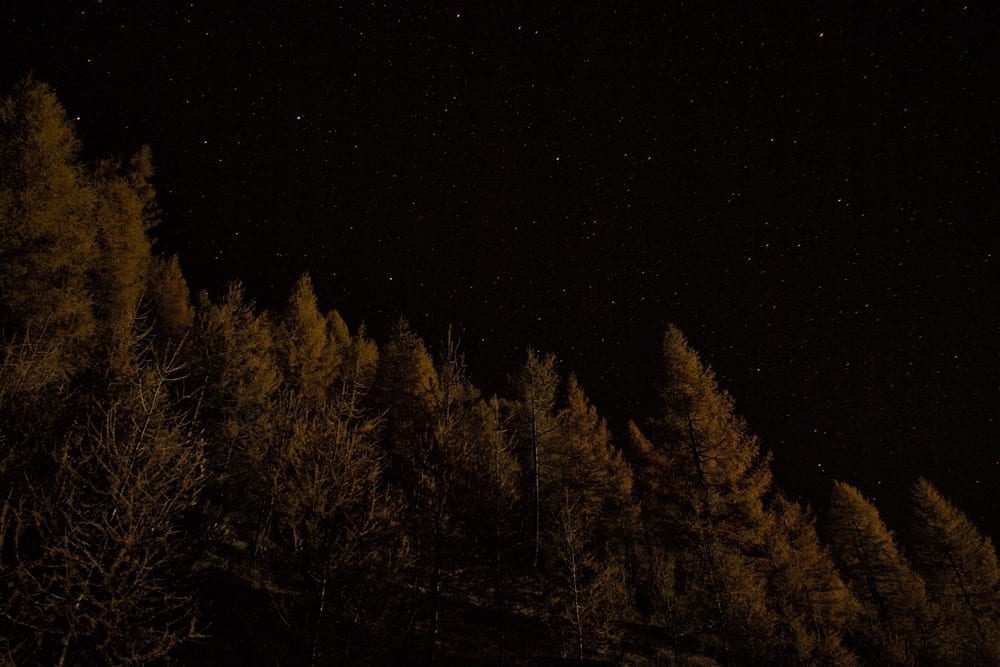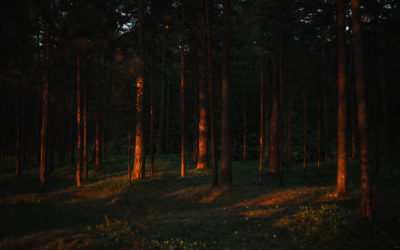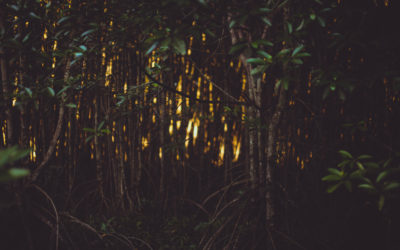The night was hot, with a heat that rose from gravel and dirt and the red Spanish tile in the kitchen, where for many other nights I had stood and looked out the window into the yard, awash in neighbors’ porch lights. Even porch lights look dry in New Mexico, not like those of the East, so thick you could pierce their skin and watch them bleed. Desert lights buzz like cicadas, the fluttery rumble of all those wings and photons shuffling against each other and stretching into an air so thin you wonder if it is even there. When all else is quiet, there is still that soft, eternal flickering. The night was hot. And quiet, for a time.
That is the night I have come for, because that is the night that came for me.
Night is a strange, inevitable thing that has always known how to summon fear, and I have often answered the call. Even as a child, there was no comfort in those hours when we wait once again for daybreak, for the return of warmth and light. We are shrouded in the shadow of our own planet, half frozen. Like reptiles lacking a warm rock, we languish, slow, sleep if we are lucky. We lay down our arms and pray no one picks them up. We pray for mercy. If I die before I wake, I pray the lord my soul to take. We are taught to whisper the words as children, remind ourselves even then that movement and breath are temporary, that eventually we all return to stillness.
Nine years ago, a man walked past my window and saw an opportunity. He killed the lights and tried to kill a piece of me, too.
When I was young, night was easier to wait out. Monsters hid in closets and ghosts under beds; those otherworldly terrors, eager for opportunity. But I had an escape down the hall, a balm for restlessness. I would tiptoe on the carpet to my parents’ room, turn the doorknob as slowly as I knew how to turn a thing, crawl to the foot of their bed, and tuck myself among the pile of clothes I often found there. My mother’s blouses were cool against my cheeks. The humidifier whirred and exhaled; it sounded like an airplane soaring. There, I was safe.
In college, the night kept me awake for different terrors. A new anxiety sprouted. It took root in my chest, grew fierce like a weed, snaked beneath skin, unfurled tendrils in each of my veins, budded and bloomed. It filled me like a poison, and I knew that if I slept it would kill me. And so I didn’t sleep, not until daybreak, not until the sun beat back the fear, not unless someone was there who could tell me night could not kill. Of course, that is not always so.
Through so very much of my life, I have stayed awake for fear. The silly irony is that for years, decades even, that insomnia was fueled by the irrational, and I knew it. I worried over ghosts as a child. As a young woman, I agonized over the chances of a soft and sudden death, an unknown rebellion in my body that would come to claim me if I was not awake to stop it. I knew what it was; that fear had a name. I struggled against the improbable and impossible because my mind would not allow it to be any other way.
There was something to fear from the night, but it was not what had haunted me.
When that fear finally came to my door, I was alone. I had fallen asleep with the light on, but I woke to darkness. A strange man had climbed into bed with me, and before the adrenaline started to stir, I knew it was more than a nightmare.
All women are taught how to protect themselves: Avoidance. Prevention. You learn how to walk down the street at night, always away from alleys, never close to cars when you cannot see inside, under streetlights, with your hands on your keys or fingers poised to dial, headphones put away, alert and aware and watching. You learn how to accept a date with a man, in a public place, after telling a friend where you will be and when you will be there, who you will be with in case she ever needs to track him down. You do not accept the offer for a ride. You tell them “not tonight” when they ask to take you somewhere removed. You learn how to walk and dress and laugh for protection. You learn how to exist in the space where you are supposed to be desirable but not too much so.
If it has already taken root, you have to cut it out, but you can’t kill a phantom limb.
This is how we learn to protect ourselves, because this is the best chance we have. We are smaller. Our strength is not in our fists. When we have to punch to protect ourselves, we are the underdogs. If we are prepared, then we train, learn to use physics to our advantage. But you must train often to remember in that moment, the moment you hope will never come. Spiders are gifted with one ability or another, speed or power, but rarely both. We must, too, accept our realities, and use them. We know we have to be smarter, because we are not stronger.
On that night, I was 26. Sized up at 5 feet, 2 inches. I weighed 105 pounds. I lived alone.
If you remember nothing else from this story, remember this: Scream. Never stop screaming. Scream as though your life depends on it, because it does. Scream loud enough to break glass, big enough to wake the dead, desperate enough for God’s attention. Scream the names of people you know, even if they cannot hear you, even if they are nowhere close, because he does not know that. Scream their names, because he will think someone is coming. He will be wrong, but you will win.
Still, it takes a certain amount of luck. I am lucky that the man who climbed through my window in the middle of the night, unplugged my bedside lamp, undressed himself, and tried to rape me did not have a gun or a knife. I am lucky he didn’t knock me unconscious. I am lucky that after lord-knows-how-long of begging and bartering and clawing, I decided to scream again, hoped someone would hear me through that open window, screamed for my neighbors because I knew they would save me if they could. I am lucky I did not give up or freeze, lucky that self-preservation is primal and ferocious. I am lucky that when I did not know my neighbors couldn’t hear me, he didn’t know it either. I am lucky that man, who smelled like sweat and unwashed hair, who called me a pretty little thing and put his lips on my neck as I writhed, was a coward, but of course he was. I am lucky that coward slipped back out through my window when I screamed, and that as I ran barefoot to my neighbors’ house with 911 ringing in my ear, he did not tackle me. I am lucky he never came back.
It would be two years until I saw his face for the first time, because on that hot, desert night in a room with a torn-out lamp, he was only a shadow, shrouded by the absence of our sun. He was a spider with quick legs, weak and sudden and unseen. I had searched those shadows for his face and could not find it. And after, when the police had filed their report and my sheets had been taken for evidence and my body scrubbed clean, I continued to look for him. The man in the coffeeshop who made my heart race. The man walking on the sidewalk who caused me to park my car and call 911; that poor man, who had done nothing and was questioned for no reason. He was everywhere. Even when I was alone, he was there.
He waited behind unopened doors, behind shower curtains, in the backseat of my car. He was always at the window, in the wind, tapping with branches. He was the sound of silverware clattering and the lips of my boyfriend against my neck. He was the darkness, night personified. I couldn’t sleep alone, not even in the day. I couldn’t be alone, not even in the day. Every breath was an echo.
Terror recedes gradually, as does grief. But it arrives quickly. It is the storm that comes out of nowhere and traps you, the truck that t-bones you, the phone call that changes your life. It comes at you without warning, a hurricane from a sunny day, one thousand miles per hour. It does not depart with the same sense of urgency. It takes residence in you, a squatter. It takes awhile to kick that motherfucker out. If it has already taken root, you have to cut it out, but you can’t kill a phantom limb.
I had moved on, or at least done my best to cut out the worst of him. A large dog is a good salvation for sleepless nights, better protection than any weapon or medicine. The meaning one dog has to your life will be deeper than you will ever be able to explain to someone who has not lived with the fear of closing their eyes. Dogs help. So does time, the number of nights between you and The Thing That Happened. Each night you are not attacked in your sleep dilutes the panic, one more drop in the bucket. Two years provide an adequate amount of nights.
They had never found him, you see. They had taken my sheets and sent them to the lab; they had kept an eye on the streets around my neighborhood, looked for patterns as best they could, or so they told me. But in two years they had not found him. He would always be a shadow on a terrible night. And then one day he wasn’t.
Nine years is enough time, I have found, to stop wondering about who and why.
It was only because I worked at a newspaper, because I had heard rumors one summer that the city’s crime labs were backed up, that some DNA kits never left their shelves because there were simply too many of them and not enough people. I decided to call the head of the city’s crime lab to see if it was true, or at least to see what he would tell me. I spent three hours sitting across from him at his desk talking about procedure and rates and intake. He claimed there was nothing to the rumor, as I’m sure it was his job to claim. Perhaps it’s even what he believed. He told me everything was processed, even if it took time, that victims—or, as we like to call them now, survivors—were notified, regardless of whether they found a match. I told him about what happened to me, that I had never been contacted, never heard a verdict, even though for months I had called and asked. He seemed concerned, perhaps more for the recorder sitting on the table between us than the hours and days and years I had waited, hoping for an answer. I can’t say I blame him. It’s hard to care too much about that which does not touch us.
Two weeks after that meeting, I got a phone call. There was something to the rumors. The mass of sheets stripped from my bed had never been tested. For two years, they sat on a shelf, wrapped in plastic. For two years, they waited, soiled with the DNA of a man who was already on record, a man with a name and a face and more freedom than he deserved. A man who was a suspect in another attempted rape (perhaps attempted, perhaps not) a week prior, and who had been taken into custody, coincidentally, for a traffic violation. They had him.
I am embarrassed to admit that I hesitated before pressing charges. I worried he would come for me, that he would learn my name, too. I did press charges, of course. I used every bit of privilege I had to put him away for as long as I could.
If you remember two things from this story, let the second be this: Kidnapping charges bring higher sentences than assault and attempted rape. Much higher. If someone keeps you in a place against your will, prevents you from leaving, charge him with kidnapping. Lock him away for as long as you can, because every night he is in jail is a night he cannot sneak into a woman’s home and try to rape her, another night that she remains free.
Nine years ago, a man walked past my window and saw an opportunity. He killed the lights and tried to kill a piece of me, too. I don’t know why he did it. I eventually learned his face and his name, but not who he is, not what his mother called him or whether his father beat him or if he was simply born with part of his brain wired the wrong direction. I do not know him at all.
But nine years is enough time, I have found, to stop wondering about who and why. There are so many other places to put one’s wonder. And there are so many other nights, lovely and soft and still, that do not trade in fear, but lead us simply back to day.






0 Comments